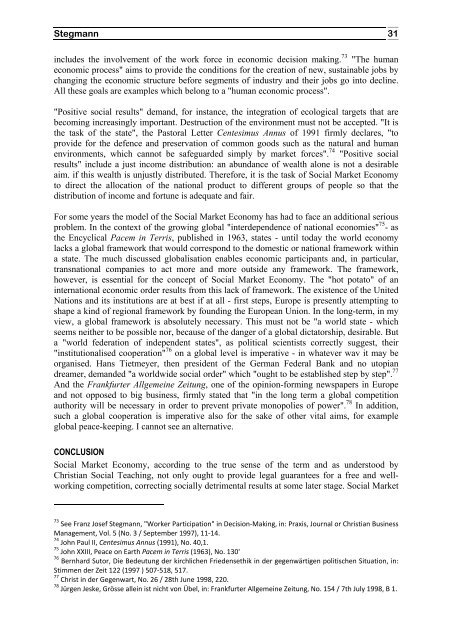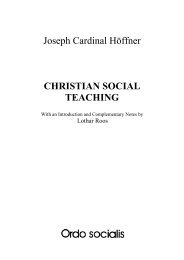Prof. Franz Josef Stegmann Bethlehem Social ... - Ordo Socialis
Prof. Franz Josef Stegmann Bethlehem Social ... - Ordo Socialis
Prof. Franz Josef Stegmann Bethlehem Social ... - Ordo Socialis
Create successful ePaper yourself
Turn your PDF publications into a flip-book with our unique Google optimized e-Paper software.
<strong>Stegmann</strong><br />
includes the involvement of the work force in economic decision making. 73 "The human<br />
economic process" aims to provide the conditions for the creation of new, sustainable jobs by<br />
changing the economic structure before segments of industry and their jobs go into decline.<br />
All these goals are examples which belong to a "human economic process".<br />
"Positive social results" demand, for instance, the integration of ecological targets that are<br />
becoming increasingly important. Destruction of the environment must not be accepted. "It is<br />
the task of the state", the Pastoral Letter Centesimus Annus of 1991 firmly declares, "to<br />
provide for the defence and preservation of common goods such as the natural and human<br />
environments, which cannot be safeguarded simply by market forces". 74 "Positive social<br />
results" include a just income distribution: an abundance of wealth alone is not a desirable<br />
aim. if this wealth is unjustly distributed. Therefore, it is the task of <strong>Social</strong> Market Economy<br />
to direct the allocation of the national product to different groups of people so that the<br />
distribution of income and fortune is adequate and fair.<br />
For some years the model of the <strong>Social</strong> Market Economy has had to face an additional serious<br />
problem. In the context of the growing global "interdependence of national economies" 75 - as<br />
the Encyclical Pacem in Terris, published in 1963, states - until today the world economy<br />
lacks a global framework that would correspond to the domestic or national framework within<br />
a state. The much discussed globalisation enables economic participants and, in particular,<br />
transnational companies to act more and more outside any framework. The framework,<br />
however, is essential for the concept of <strong>Social</strong> Market Economy. The "hot potato" of an<br />
international economic order results from this lack of framework. The existence of the United<br />
Nations and its institutions are at best if at all - first steps, Europe is presently attempting to<br />
shape a kind of regional framework by founding the European Union. In the long-term, in my<br />
view, a global framework is absolutely necessary. This must not be "a world state - which<br />
seems neither to be possible nor, because of the danger of a global dictatorship, desirable. But<br />
a "world federation of independent states", as political scientists correctly suggest, their<br />
"institutionalised cooperation" 76 on a global level is imperative - in whatever wav it may be<br />
organised. Hans Tietmeyer, then president of the German Federal Bank and no utopian<br />
dreamer, demanded "a worldwide social order" which "ought to be established step by step". 77<br />
And the Frankfurter Allgemeine Zeitung, one of the opinion-forming newspapers in Europe<br />
and not opposed to big business, firmly stated that "in the long term a global competition<br />
authority will be necessary in order to prevent private monopolies of power". 78 In addition,<br />
such a global cooperation is imperative also for the sake of other vital aims, for example<br />
global peace-keeping. I cannot see an alternative.<br />
CONCLUSION<br />
<strong>Social</strong> Market Economy, according to the true sense of the term and as understood by<br />
Christian <strong>Social</strong> Teaching, not only ought to provide legal guarantees for a free and wellworking<br />
competition, correcting socially detrimental results at some later stage. <strong>Social</strong> Market<br />
73<br />
See <strong>Franz</strong> <strong>Josef</strong> <strong>Stegmann</strong>, "Worker Participation" in Decision‐Making, in: Praxis, Journal or Christian Business<br />
Management, Vol. 5 (No. 3 / September 1997), 11‐14.<br />
74<br />
John Paul II, Centesimus Annus (1991), No. 40,1.<br />
75<br />
John XXIII, Peace on Earth Pacem in Terris (1963), No. 130'<br />
76<br />
Bernhard Sutor, Die Bedeutung der kirchlichen Friedensethik in der gegenwärtigen politischen Situation, in:<br />
Stimmen der Zeit 122 (1997 ) 507‐518, 517.<br />
77<br />
Christ in der Gegenwart, No. 26 / 28th June 1998, 220.<br />
78<br />
Jürgen Jeske, Grösse allein ist nicht von Übel, in: Frankfurter Allgemeine Zeitung, No. 154 / 7th July 1998, B 1.<br />
31















